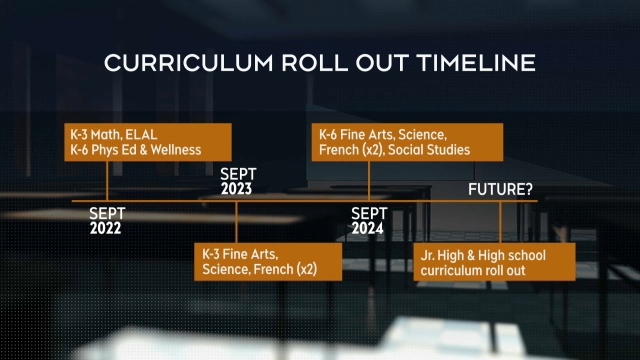Alberta announces 3 phases for curriculum rollout as criticism continues
Alberta expects to implement its entire new K-6 curriculum in time for September 2024, but advocates for teachers and students still say the rollout is rushed with the first phase scheduled for this fall.
Last month, Education Minister Adriana LaGrange announced the province would first apply the new English and math curricula for K-3 students and phys-ed for all of K-6, but delayed everything else.
 The Alberta government announced the timeline for its new K-6 curriculum on Wednesday. (CTV News Edmonton)
The Alberta government announced the timeline for its new K-6 curriculum on Wednesday. (CTV News Edmonton)
"These three subjects in Alberta’s new K-6 curriculum are critical starting points that will set students on the best path for success," LaGrange said on Wednesday.
On Wednesday, the province announced the rest of the timeline:
- English Language Arts and Literature: Grades 4 to 6 in September 2023
- Math: Grades 4 to 6 in September 2023
- Science: K-3 in September 2023; grades 4 to 6 in September 2024
- Social studies: K-6 in September 2024
- Fine arts: K-3 in September 2023; grades 4 to 6 in September 2024
- French: K-3 in September 2023; grades 4 to 6 in September 2024
The timeline is based on recommendations from the Curriculum Implementation Advisory Group, a group created to help guide the rollout.
According to the province, changes made to the draft curriculum addressed content load, age appropriateness, wording clarity and First Nations, Metis and Inuit content.
In 2022-23, the province is also investing $59 million in teacher professional learning and teaching resources to make sure educators and students are prepared for the updated curriculum.
'TEACHERS ARE WORRIED'
The curriculum rollout has been heavily criticized over the past year.
In late 2021, the province decided to delay the implementation of the social studies, fine arts and science curricula after heavy criticism related to the drafts released earlier that year.
Rallies were held in Edmonton, Calgary, Red Deer, Grande Prairie, Lethbridge and Medicine Hat earlier this month, where protesters called for the government to pause the introduction of the new curricula this fall.
"Parents, teachers, trustees, academics, racialized Albertans, francophones and Indigenous leaders have repeatedly called on this government to scrap their widely discredited K-6 curriculum rewrite," NDP Education Critic Sarah Hoffman said.
"We just don't think these subjects have been substantially revised or improved enough to meet the criteria that experts are saying really needs to meet the threshold," agreed Wing Kar Li, communications director for Support our Students.
Last month, the ATA released a survey that showed five per cent of teachers agree the new K-6 curriculum will be positive for students, and three per cent reported they have the resources to support its implementation.
ATA president Jason Schilling said teachers don't have enough time to "meaningfully" prepare to implement it.
"Teachers don't trust this minister to take their concerns seriously over the curriculum implementation strategy," ATA president Jason Schilling said.
"Teachers know what will and what will not work in their classrooms, and to be disregarded around this process, the content, the implementation plan, the resources, the assessment of this curriculum throughout the process, has been a disrespectful move by Alberta's government in moving forward with this curriculum."
CTVNews.ca Top Stories

opinion Tom Mulcair: Prime Minister Justin Trudeau's train wreck of a final act
In his latest column for CTVNews.ca, former NDP leader and political analyst Tom Mulcair puts a spotlight on the 'spectacular failure' of Prime Minister Justin Trudeau's final act on the political stage.
B.C. mayor gets calls from across Canada about 'crazy' plan to recruit doctors
A British Columbia community's "out-of-the-box" plan to ease its family doctor shortage by hiring physicians as city employees is sparking interest from across Canada, says Colwood Mayor Doug Kobayashi.
'There’s no support': Domestic abuse survivor shares difficulties leaving her relationship
An Edmonton woman who tried to flee an abusive relationship ended up back where she started in part due to a lack of shelter space.
Baseball Hall of Famer Rickey Henderson dead at 65, reports say
Rickey Henderson, a Baseball Hall of Famer and Major League Baseball’s all-time stolen bases leader, is dead at 65, according to multiple reports.
Arizona third-grader saves choking friend
An Arizona third-grader is being recognized by his local fire department after saving a friend from choking.
Germans mourn the 5 killed and 200 injured in the apparent attack on a Christmas market
Germans on Saturday mourned the victims of an apparent attack in which authorities say a doctor drove into a busy outdoor Christmas market, killing five people, injuring 200 others and shaking the public’s sense of security at what would otherwise be a time of joy.
Blake Lively accuses 'It Ends With Us' director Justin Baldoni of harassment and smear campaign
Blake Lively has accused her 'It Ends With Us' director and co-star Justin Baldoni of sexual harassment on the set of the movie and a subsequent effort to “destroy' her reputation in a legal complaint.
Oysters distributed in B.C., Alberta, Ontario recalled for norovirus contamination
The Canadian Food Inspection Agency has issued a recall due to possible norovirus contamination of certain oysters distributed in British Columbia, Alberta and Ontario.
New rules clarify when travellers are compensated for flight disruptions
The federal government is proposing new rules surrounding airlines' obligations to travellers whose flights are disrupted, even when delays or cancellations are caused by an "exceptional circumstance" outside of carriers' control.


































